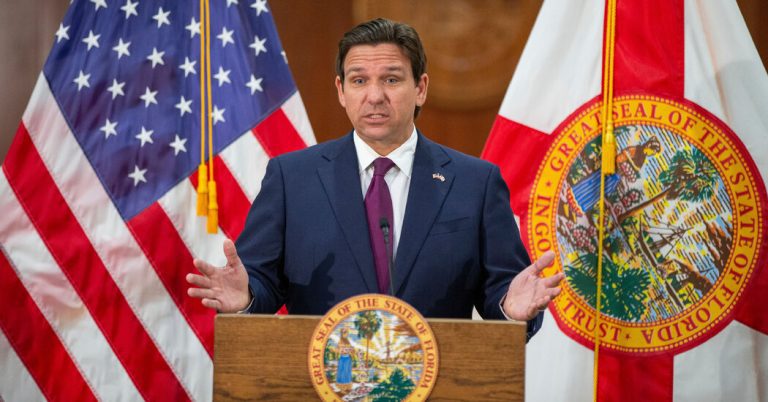Florida on Monday became the first state to effectively ban residents under the age of 14 from maintaining accounts on services like TikTok and Instagram, enacting a tough social media bill that is likely to upend the lives of many young people.
The landmark law, signed by Gov. Ron DeSantis, is one of the most restrictive measures a state has enacted so far in an escalating national push to isolate young people from potential mental health and safety risks on social media platforms. The statute both prohibits certain social networks from giving accounts to children under 14 and requires the services to terminate accounts that a platform knew or believed belonged to underage users.
It also requires platforms to get a parent’s permission before giving accounts to 14- and 15-year-olds.
At a press conference on Monday, Mr. DeSantis welcomed the measure, saying it would help parents navigate the “difficult terrain” online. She added that “being buried” in devices all day was not the best way to grow up.
“Social media harms children in a number of ways,” Mr. DeSantis said in a statement. The new bill “gives parents greater ability to protect their children.”
Mr. DeSantis had vetoed an earlier bill that would have banned social media accounts for 14- and 15-year-olds even with parental consent. The governor said the previous bill would infringe on parents’ rights to make decisions about their children’s online activities.
Florida’s new measure is almost certain to face constitutional challenges over the rights of young people to freely seek information and the rights of corporations to distribute information.
Federal judges in several other states recently halted less restrictive internet security laws on free speech grounds in response to lawsuits brought by NetChoice, a tech industry trade group that represents companies such as Meta, Snap and TikTok.
Judges in Ohio and Arkansas, for example, have blocked laws in those states that require some social networks to verify users’ ages and get a parent’s permission before giving accounts to children under 16 or 18. A federal judge in California has suspended a law in that state that would have required some social networks and video game apps to enable higher privacy settings by default for minors and disable certain features, such as auto-play videos, for those users by default.
In addition to age restrictions on social media, Florida’s new statute requires online pornography services to use age verification systems to keep minors off their platforms.
Apps like Facebook, Snapchat and Instagram already have policies that ban children under 13. That’s because the federal Children’s Online Privacy Protection Act requires certain online services to get parental permission before collecting personal information — such as full names, contact information, locations or selfies — from children under 13.
But state regulators say millions of underage children were able to sign up for social media accounts simply by providing false dates of birth.




